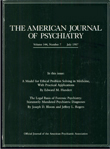Social support: a genetic-epidemiologic analysis
Abstract
OBJECTIVE: Social support is a widely used construct in the fields of mental health, sociology, and medicine and has typically been conceptualized as an environmental factor that influences the risk for dysfunction and disease. In this study a longitudinal twin design was used to clarify the etiology of social support. METHOD: A 16-item social support inventory was administered at personal interview to a population-based sample of female twins twice, approximately 5 years apart. A twin measurement model-which permits an estimation of the etiologic role of genetic and environmental factors correcting for errors of measurement or short-term temporal fluctuations-was applied to these data. RESULTS: Six factors, which were moderately stable over time, were found: relative problems, friend problems, relative support, confidants, friend support, and social integration. The best-fitting twin measurement models indicated that genetic factors were of substantial etiologic significance for all six social support scales. Heritabilities of the stable component of social support ranged from 43% to 75%. Familial-environmental factors contributed to twin resemblance only for relative problems and relative support. No evidence was found for significant biases in the twin method. CONCLUSIONS: Measures of social support are moderately stable over time. When short-term fluctuations are corrected for, heritable factors are of substantial etiologic importance for social support as measured at personal interview. Treating social support solely as an environmental measure is probably incorrect. Through genetically influenced traits such as temperament, individuals play a substantial role in creating their own social environments.



